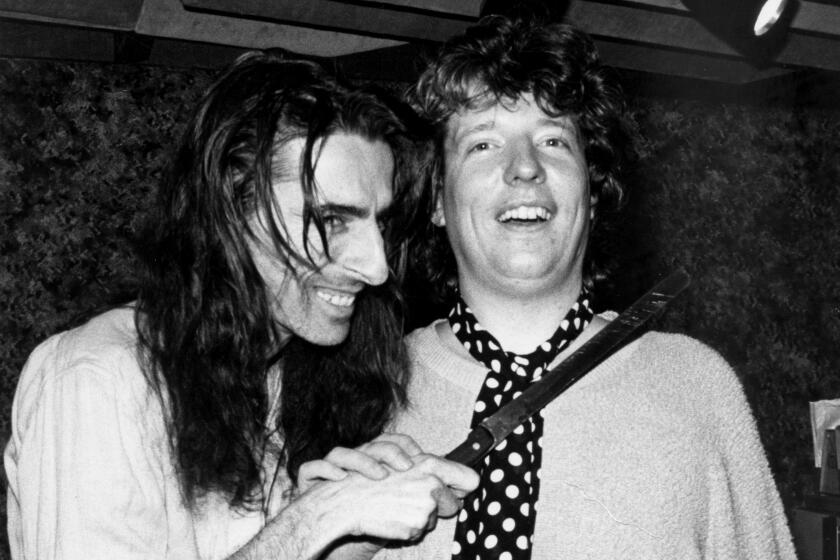POP MUSIC : New Jack Swingman : Guy’s leading guy, Teddy Riley, draws from rap, R&B;, gospel and funk as he designs pop’s hippest, hottest sound
- Share via
NEW YORK — Though the term might not sound familiar, the sound of “new jack swing” has been inescapable during the last two or three years--whenever, in the words of L.L. Cool J, “those cars drive by with the boomin’ systems.”
Merging hip-hop’s rough beats with sweet synthesized melodies, and dropping hot raps alongside real singing, “new jack swing” is one of the few signs of life in the current Top 40 doldrums.
For the record:
12:00 a.m. Feb. 10, 1991 For the Record
Los Angeles Times Sunday February 10, 1991 Home Edition Calendar Page 95 Calendar Desk 1 inches; 29 words Type of Material: Correction
Teddy Riley produced only the 12-inch single dance remix of Jane Child’s “Don’t Want to Fall in Love.” Child produced the original version of the song. A Feb. 3 article on Riley gave incorrect information.
The most successful exponents of this sound have been nuevo soul men Bobby Brown, Keith Sweat and Al B. Sure!. The second album by the trio Guy adds a fourth name. Teddy Riley, the man behind those three singers’ hit singles, has finally stepped out.
Riley is both the leader of Guy and the architect of the new jack swing sound. At 24, this soft-spoken New Yorker is a veteran of the recording studio--he’s also produced and/or co-written hits by rapper Kool Moe Dee and, most recently, “Don’t Want to Fall in Love” by Jane Child. One of Riley’s strengths is knowing when to intercede and when to hang back and let his collaborators do their own thing. With Guy, this method allows the voices of brothers and co-members Aaron and Damion Hall to lift “The Future” out of the dance-music record bins to the sanctified level of soul music.
What really sets Guy’s new album apart is the deeper, more personal grain of the group’s collective songwriting. Of course, you can still dance to it. “I really didn’t think this album was going to work,” admits Riley, during a break in a recent re-mixing session. “It’s not what I usually do, but I felt like I had to change.”
A lot has happened since Guy’s 1987 debut album, both to Teddy Riley and the Harlem milieu from which he’s always drawn inspiration. New jack swing got its name from a small but flamboyant segment of its audience: the extremely ruthless, extremely young gangs of drug dealers (“new jacks”) who took over the streets of many big cities in the late ‘80s. New jack swing is the soundtrack of a real-life action movie--and for most of its characters, there’s no sequel.
Growing up in Harlem, Riley couldn’t avoid the rise of the new jacks. When his half-brother Brandon Mitchell--a rapper with the Riley-produced crew Wrecks-in-Effect--was shot to death in 1989, Riley decided that he’d had his fill. He gathered up his family and burgeoning business operation, and set out for comparatively peaceful Virginia Beach, Va.
Perhaps just as important, Riley also decided to put these experiences and feelings into song:
I want to be long gone
where the wind blows free
from sea to sea
where I can be me
I’ve gotta be long gone
somewhere I can call home
“I wrote ‘Long Gone’ (from “The Future”) when we were moving from New York down to Virginia Beach last year,” Riley says. “The day my little brother got killed, I said, ‘We got to go. We got to move.’ We got a lot of angry people up here, a lot of jealousy. The new jacks don’t mean to hurt you, they don’t mean to harm you, but they want to be where you are. We want to help them, but at the same time, they’re going too fast. Everybody’s living in the fast lane up in New York.”
But with its yearning, tenderly sung chorus, Guy’s “Long Gone” summons up the rootsy longing for a rural escape from the reality of the streets--a response most listeners associate with country music.
The rest of “The Future,” however, projects a tougher, more resilient musical vision.
But in 1989, even Virginia Beach picked up a rep for being something less than tranquil. A Labor Day altercation between police and partygoers at the annual Greek Fest--a gathering of 100,000 or so mostly black fraternities and sororities--turned into a full-scale riot. Riley, for one, thinks the situation has chilled out considerably since then.
“That was just one night when some people got stupid and started acting crazy,” he says.
“I went down there to settle down. Anyway, none of that happens in the area where I live,” Riley says.
Leaving the city didn’t mean he left behind a certain amount of anxiety. He’s not paranoid about it; he just sees the threat of violence as a fact of life.
“My area is exclusive; the police are on guard 24 hours; there’s security at each home,” Riley said. “You can’t go there and think you’re going to rob somebody.
“One thing I never forget is where I come from. There’s a saying that Mike Tyson has: You can take a kid out of the ghetto, but you can’t take the ghetto out of a kid. That goes with all of us in Guy.
“We know how to get out of the ghetto now, so we want to try and bring other people along. Like I brought my little brothers to Virginia so they wouldn’t get themselves into trouble--trouble they couldn’t get out of. Because I was once in that situation, and I prayed to God to get me out. This will never happen again! And my crime was small compared to a lot of new jacks out there--I was driving without a license. These guys get busted and it’s nothing to them.”
Guy and Teddy Riley have some extensive musical roots, in soul, gospel, R&B; and funk. They draw on all of it, without ever becoming mired in classicism or nostalgia.
“I come from a rap family,” Riley says proudly. “I was there when it was happening, back in the days rap wasn’t even out yet when I first heard about deejays’ scratching and beatboxes. That stayed in my head, and at the same time, my mother was sayin’ ‘Let’s go to church.’ So that stayed in my head too. All those different keyboard players--uh, preachers. There was one in particular, a Rev. Caulfield, who was a genius on the organ. That’s really where I learned everything about playing keyboards.”
Riley’s background gives him an edge over his competitors that’s not purely spiritual. Many of today’s studio wizards are masters of technology, not music. They couldn’t sit down at the piano and improvise a melody line if their lives depended on it. But even Guy’s funkiest constructions are built on a solid musical base, and that grounding is what makes their rhythmic grooves really swing.
“I hear echoes of my style on other people’s songs,” Riley says. “I even hear echoes of my voice. It’s flattering, but hey--that’s not what you do if you want to become a leader. A lot of producers out there are thinking: ‘I can put a little bit of Teddy’s stuff in there.’ And then they put it out. That’s why, back in (the ‘70s), producers were heard but not really seen--they weren’t a visual presence. Because they were all copying each other, stealing the same style.
“Funk was sounding the same, R&B; was sounding the same, disco was sounding the same. Everybody was tryin’ to hit the high notes and steppin’ on each others’ toes. Marvin Gaye and Stevie Wonder, why, they’d come out with something completely different and take everybody’s breath away. That’s what Guy and Teddy Riley are all about: We’re the people who take your mind away and say, ‘Jump to this.’ ”
The mention of Motown’s two most independent--and idiosyncratic--stars is entirely fitting. Teddy Riley’s future plans and ambitions extend beyond merely recording hits for his own group and others; he wants to manage a stable of acts, building and “grooming” a creative dynasty in the mold of Berry Gordy and Motown in the ‘60s, or Gamble-Huff’s Philadelphia International operation in the ‘70s. Talking about a young group who slipped through his fingers, Teddy Riley sounds a bit wistful. “Four young good-looking white guys . . . they could have been New Kids on the Block,” he said.
“I reached out and found some other guys, though,” he continues. “It’s gonna take me some time to groom them. Gotta make sure they have the right attitude, the right image, the right style, the right look. I know how to do all that because I was worked the same way. One of the guys who groomed me was my old manager, Gene Griffin.”
Griffin entered the dance music scene with a splash back in 1984; one of Sound of New York’s earliest releases, “Last Night a DJ Saved My Life” by Indeep quickly became a club favorite.
“He showed me a lot. But the one thing he never taught me was how to be in control, how to learn more. I had to learn that on my own. He never taught me about the specifics of the music business: how to read a contract, how you’ve always gotta have a lawyer and how you’ve always gotta pay taxes.
“I couldn’t hire anybody from my family because my manager had already hired everybody from his family!” Riley says. “Luckily, we got this great Guy deal on the second go-round, otherwise I’d probably be in jail right now. I didn’t have enough money to pay my taxes last year. It woke me up.”
There’s a thumping, up-tempo diatribe called “Total Control” on “The Future” that presents this all-too-typical situation as a cautionary tale. “It could happen to a lot of people,” Riley says of his trouble with Griffin, “and they don’t even know it. ‘Total Control’ wasn’t hard to write because it was already done. It was reality--the truth. I mean, I hope he’s not offended by it, but that’s the way we felt, the way it came out. Where I come from, you don’t hold back.”
Griffin hasn’t completely held back either; his Motown-affliated Sound of New York, had a minor R&B; hit last year with the debut album by a vocal group called Basic Black--produced, managed and, presumably, groomed by Gene Griffin. Between its huffing synth riff and pleading vocals, Basic Black’s hit single “Whatever It Takes,” bears an unmistakable similarity to Guy. Griffin did not return calls for comment.
According to Riley, the gospel of new jack swing is “love and reality.”
“What we’re trying to do in our songs is show people how things are going to be in the future,” Riley says. “We don’t want to do an anti-racism or anti-drug record, or a drug video. We just want to show what life in the future might be if you drop the guns and stay away from drugs.
“The next album after this one, I think, won’t be strictly saying what the world should be about. It’s gonna be more about love, relationship-wise. Something about people’s lives, like that soap opera ‘One Life to Live’ . . . only we’ll make it more realistic.”
More to Read
The biggest entertainment stories
Get our big stories about Hollywood, film, television, music, arts, culture and more right in your inbox as soon as they publish.
You may occasionally receive promotional content from the Los Angeles Times.









